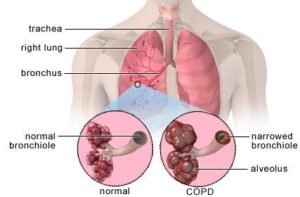COPD, or chronic obstructive pulmonary disease, affects millions worldwide, making daily activities like breathing a constant challenge. While there’s no cure, managing COPD involves a multi-pronged approach, including medication, exercise, and – you guessed it – diet! Certain foods can worsen COPD symptoms, so understanding what to avoid is crucial.
This article dives into the latest information on the worst foods for COPD, empowering you to make informed choices and breathe a little easier.

Understanding COPD and Food
COPD is a progressive lung disease that primarily restricts airflow. This can lead to shortness of breath, tightness in the chest, and excessive mucus production. While medications help manage these symptoms, diet also plays a significant role.
Certain foods can trigger inflammation, increase mucus production, or cause bloating, all of which can exacerbate COPD symptoms. Let’s explore the top culprits to avoid:
1. Salty Foods: The Silent Saboteur
We all know too much salt is bad, but for COPD patients, it’s especially problematic. Sodium can cause fluid retention, leading to swelling in the body, including the tissues around the lungs. This makes breathing even harder.
Essential Tips:
- Limit processed foods, canned goods, and restaurant meals, which are often loaded with sodium.
- Embrace fresh ingredients and cook at home to control salt intake.
- Experiment with herbs and spices to add flavor without the added sodium.
2. Deep-Fried Foods: Packing a Punch (to Your Lungs)
Deep-fried foods are high in unhealthy fats and can trigger inflammation throughout the body, including the airways. This inflammation can worsen COPD symptoms like coughing and wheezing. Additionally, greasy foods can be dehydrating, further compromising lung function.
Essential Tips:
- Ditch the deep fryer! Opt for healthier cooking methods like baking, grilling, or steaming.
- Choose lean protein sources like grilled chicken or fish instead of fried options.
3. Cruciferous Vegetables: Friends or Foes?
Cruciferous vegetables like broccoli, cauliflower, and cabbage are packed with nutrients and boast anti-inflammatory properties. However, they’re also high in fiber, which can cause bloating and gas in some people with COPD. This bloating can put pressure on the diaphragm, making breathing more difficult.
Essential Tips:
- Don’t eliminate these healthy vegetables entirely!
- Try incorporating them in smaller portions or cook them thoroughly to make them easier to digest.
- If bloating persists, consider low-FODMAP alternatives like leafy greens or zucchini.
4. Carbonated Beverages: Fizzy but Troublesome
Fizzy drinks like soda and sparkling water can cause bloating and gas, just like cruciferous vegetables. Additionally, sugary drinks can contribute to weight gain, putting extra strain on your lungs.
Essential Tips:
- Quench your thirst with water! It’s essential for optimal lung function and helps clear mucus.
- Explore flavored water options with fruits or herbs for a refreshing twist.
5. Added Sugars: A Sweet Threat
Added sugars not only contribute to weight gain but can also trigger inflammation in the body. Chronic inflammation is linked to worsened COPD symptoms.
Essential Tips:
- Be mindful of hidden sugars in processed foods and sugary drinks.
- Read food labels carefully and choose options with lower sugar content.
- Opt for naturally sweet fruits over sugary treats.
6. Processed Meats: Beyond Nitrates
While nitrates used to preserve meats like cold cuts and hot dogs have been linked to increased COPD exacerbations, a recent study (2021) suggests the exact mechanism needs further investigation. However, these processed meats are often high in sodium and unhealthy fats, which can still worsen COPD symptoms.
Essential Tips:
- Limit processed meats and opt for lean protein sources like chicken, fish, beans, or lentils.
- When choosing meats, look for uncured or naturally cured options.
7. Acidic Foods and Drinks: A Heartburn Hassle
Acidic foods like citrus fruits, tomatoes, and coffee can trigger heartburn in some people. If you have COPD and experience frequent heartburn, it can worsen your breathing difficulties. This is because heartburn causes stomach acid to rise into the esophagus, irritating the airways and triggering coughing.
Essential Tips:
- Identify if certain acidic foods trigger heartburn for you.
- If so, limit those foods or try consuming them in smaller portions.
- Elevate your head while sleeping to prevent acid reflux.
8. Sulfite Sensitivity: Not Just for Wine
Sulfites are preservatives commonly found in dried fruits, processed potatoes, shrimp, and some beverages like wine and beer. While not everyone with COPD has sulfite sensitivity, it can cause airway constriction and breathing problems in some individuals.
Essential Tips:
- Pay attention to food labels and avoid products with added sulfites if you suspect sensitivity.
- Opt for fresh fruits and vegetables whenever possible.
- Choose natural wines that are less likely to contain sulfites.
Beyond Restrictive Diets: The Power of COPD-Friendly Foods
While avoiding certain foods can be beneficial, incorporating COPD-friendly options is equally important. Here are some dietary heroes to embrace:
- Fruits and Vegetables: Rich in antioxidants and vitamins, fruits and vegetables help fight inflammation and promote lung health.
- Whole Grains: Opt for brown rice, quinoa, and whole-wheat bread for sustained energy and healthy fiber intake.
- Lean Protein Sources: Fish, chicken, beans, and lentils provide essential nutrients for maintaining muscle strength and overall health.
- Healthy Fats: Omega-3 fatty acids found in fatty fish and flaxseeds have anti-inflammatory properties that can benefit COPD patients.
Remember: You’re Not Alone
Living with COPD can be challenging, but managing your diet is a powerful tool to take control of your health and feel better. Remember, these are general recommendations, and it’s always best to consult a registered dietitian or healthcare professional for personalized guidance. They can help create a COPD-friendly meal plan that caters to your specific needs and preferences.
Here are some important tips for success:
- Keep a Food Diary: Track your meals and any symptoms you experience to identify potential food triggers.
- Plan Your Meals: Planning helps you make healthy choices and avoid unhealthy temptations.
- Cook More at Home: This allows you to control ingredients and portion sizes.
- Don’t Be Afraid to Experiment: Explore new recipes and find healthy COPD-friendly dishes you enjoy.
By incorporating these tips and embracing a COPD-friendly diet, you can breathe a little easier and take control of your health journey.
